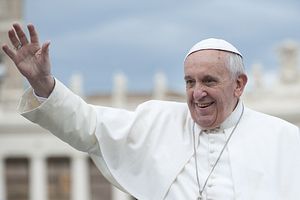Pope Francis is in South Korea this week, this first trip to the Asia-Pacific by a pope since 1995, when John Paul II visited the Philippines. On the way, Francis’ plane passed over Chinese airspace, and the pope sent a telegram to President Xi Jinping, as per custom — the pope traditionally sends a message to the leader of each country he flies over or passes through. The brief message to Xi (and the fact that Francis was allowed to use Chinese airspace at all) sparked discussion of a possible thaw in China-Vatican relations.
China and Vatican City currently do not have diplomatic relations. According to Beijing, there are two main obstacles to a full relationship: Vatican’s diplomatic ties with Taiwan, and the Vatican’s desire to interfere in China’s internal affairs. Responding to news that Pope Benedict XVI, Francis’ predecessor, was retiring, Foreign Ministry Spokesperson Hong Lei said that “China is willing to develop relations with the Vatican if the Vatican severs its diplomatic ties with Taiwan and refrains from interfering in China’s internal affairs… particularly the interference in the name of religion.”
The first obstacle — Vatican City’s diplomatic ties with Taiwan — seems to be the easier of the two. The Vatican may indeed be ready to sever ties with Taiwan in order to gain diplomatic relations with China. A Hong Kong bishop indicated as much in remarks made soon after the death of Pope John Paul II. However, as the bishop emphasized, “We have got to start negotiations before talking about what we can give.” In other words, the Vatican expects something from China in return for severing ties with Taiwan, and what it wants touches on China’s accusations of “interference.”
China does not recognize the pope’s authority over the Chinese Catholic Church. Chinese Catholics who do look to the Holy See for spiritual leadership worship in underground churches. These congregations and their leaders face the risk of imprisonment by Chinese authorities. At least eight bishops and priests from these underground churches have been arrested, much to the Vatican’s dismay. The Vatican sees a lack of religious freedom as a major stumbling block to deeper relations in China. Furthermore, the Holy See seeks unity between China’s government-sanctioned and underground Catholic churches – which would require Beijing to tacitly accept Catholic congregations who embrace papal authority.
Within the broader question of the pope’s authority in China, the key problem involve appointing church officials. The Chinese government reserves the right to appoint its own bishops — something the Vatican refuses to accept. The Holy See believes that the appointment of bishops is entirely a religious affair, and should not be subject to interference from local governments. Tensions over this issue erupted in 2012, when the Chinese Catholic Patriotic Association (the state-approved body that governs China’s Catholic Church) once again ignored Vatican and appointed priest Ma Daqin to serve as auxiliary bishop of Shanghai. To Beijing’s dismay, Ma responded by renouncing his membership in the CCPA — and was promptly stripped of his new rank and placed under house arrest.
China is not the only country that challenges the Vatican’s right to appoint bishops. Frank Ching, writing for the Jamestown Foundation, points out that Vietnam also wants final approval over Catholic bishops. The Vatican and Vietnam have worked out a rough arrangement wherein both sides agree before appointing a bishop. Still, the issue remains thorny, as each side wants authority to issue the final approval. Establishing diplomatic relations with both China and Vietnam was reportedly a key goal of Pope Benedict XVI, and may be on Francis’ agenda as well. The Vietnam model, though a work in progress, may be a useful one for China and the Vatican.
The Vatican will not sever diplomatic relations with Taiwan without being assured of getting increased religious authority in return. The question, then, is whether Beijing is willing to accept some level of papal authority over China’s estimated 12 million Catholics in return for denying Taiwan its last diplomatic partner in Europe.
The Vatican is one of only 23 countries in the world to recognize Taiwan diplomatically, and the only country in Europe to do so. Thus, Taiwan’s diplomatic ties with the Vatican have provided Taipei with valuable opportunities for diplomatic forays into Europe, especially in recent years. Taiwanese President Ma Ying-jeou attended Pope Francis’ inaugural mass in March 2013, while mainland China was not represented at the international event. More recently, Vice President Wu Den-yih attended the canonizations of Popes John Paul II and John XXIII. Each of these trips incensed China.
However, to deny Taiwan future trips to the Vatican, China would have to compromise with the Holy See. Given China’s recent crackdown on Christianity, which is strongly tied to a desire to avoid foreign influences within the country, this seems unlikely. The pope, who leads the global Catholic Church, is the most obvious example of religion as a foreign-controlled entity. Would China really be comfortable with giving Francis and his successors increased influence on China’s Catholics?
Despite the impasse, there are signs that both sides are working toward some sort of compromise, perhaps involving the joint approval of new bishops. Reuters reports that unofficial emissaries are carrying messages between Beijing and the Vatican. Pope Francis also said that he and President Xi Jinping have exchanged letters. But with core issues at stake for both China and the Vatican, getting to a diplomatic partnership will be a difficult task.
































